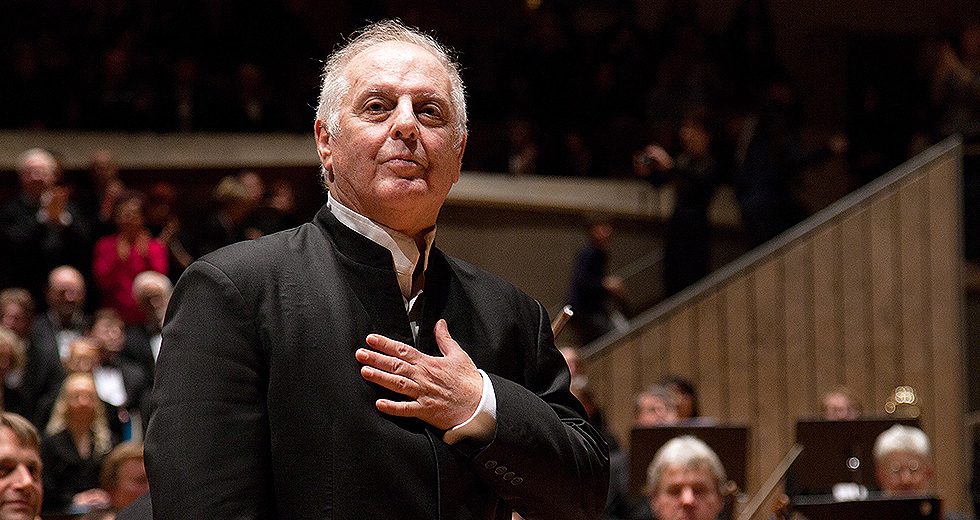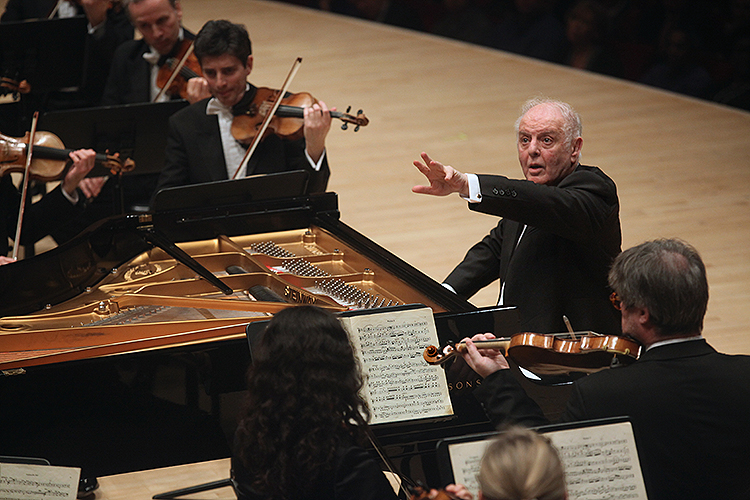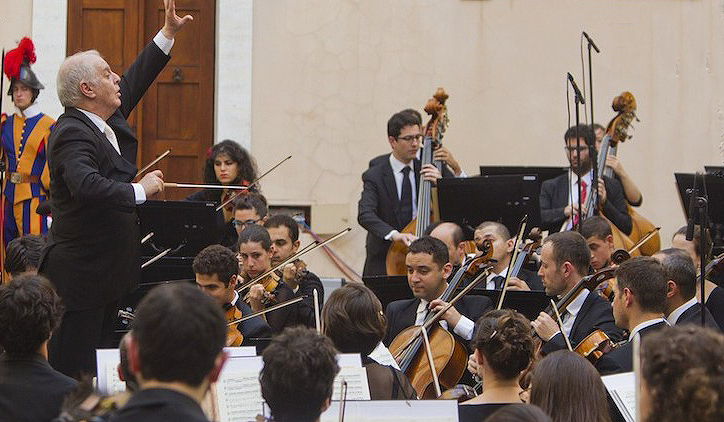
For more than 30 years, Daniel Barenboim was a major presence at the Chicago Symphony, first as a superstar pianist and rising young conductor, and then, from 1991 to 2006, as CSO music director. He was center-stage in concerts ranging from an intimate Duke Ellington jazz jam with a handful of CSO colleagues to a cycle of the complete Beethoven piano sonatas. He was on the podium for semi-staged Mozart operas, concert versions of Wagner operas and the sprawling symphonies of Mahler and Bruckner.
Now, 12 years after finishing his CSO tenure in June 2006 with a series of blockbuster ninth symphonies by Beethoven, Mahler and Bruckner, Barenboim is returning to Symphony Center. He conducts the CSO on Nov. 1-3 in the complete Má vlast symphonic cycle by Smetana. On Nov. 5 at Symphony Center, kicking off a U.S. tour, he leads the West-Eastern Divan Orchestra in music of Richard Strauss and Tchaikovsky. Barenboim and his close friend, the late Palestinian-American intellectual Edward Said, founded the orchestra in 1999. They envisioned it as a place for young Israeli and Arab musicians to work side by side in the peaceful task of making music.
When Barenboim left Chicago in 2006 he didn’t expect to return. “When it finished, I thought it was finished,” he said in a phone conversation from his home base in Berlin. “Don’t forget, I conducted the Chicago Symphony for 36 consecutive seasons.” (He missed a few seasons in the 1970s and ‘80s, but his record on the CSO podium is still a remarkable one.) But then Riccardo Muti, the CSO’s music director since 2010, made him an irresistible offer.

From the keyboard, Daniel Barenboim conducts the Staatskapelle Berlin, for which he serves as music director, at Carnegie Hall in January. | Photo: Steve J. Sherman
“When Riccardo Muti insisted that I come, I accepted with the greatest of pleasure,” he said.
Working out the details wasn’t easy, given Barenboim’s busy schedule. In addition to his post as general music director of the Berlin State Opera and the Staatskapelle Berlin, he is in demand as a guest conductor and tours regularly as a solo pianist and chamber musician. “It wasn’t for lack of trying,” said one veteran CSO musician about putting an end to Barenboim’s 12-year absence. But once Barenboim agreed to conduct in Chicago, another issue loomed.
“The greatest problem was that I wanted to find something to conduct that I had never conducted in Chicago, and after 36 years, it was very difficult,” he said. “I’m very glad I found Má vlast by Smetana, which I love very much. So I’m very, very much looking forward to it, as you may imagine.
“I grew up with a recording of Má vlast with the Chicago Symphony and Kubelik,” Barenboim said, referring to Rafael Kubelik, CSO music director from 1950 to 1953. “It’s a recording I loved and think is absolutely unbeatable, and I still think it is. But I didn’t conduct it for many, many years. I think the first time, recently, was three or four years ago. And I enjoyed it tremendously. Smetana was a very patriotic Czech, but he spoke German better than Czech. There’s a lot of influence of Beethoven and a lot of the symphonic poems of Liszt. I like that combination.”
Má vlast (My Homeland) is an evening-long cycle of six symphonic tone poems. Barenboim conducted the best-known segment, The Moldau, during his years with the CSO.
During his tenure as music director, Barenboim appointed 40 CSO members, among them, current concertmaster Robert Chen. But many new musicians, notably in the woodwinds, have joined the CSO since he left. “I’m very curious,” said Barenboim. “I’ll be very happy to see the old faces and I’m curious about the new ones.”
Barenboim also is happy to be coming up on the 20th anniversary of the West-Eastern Divan Orchestra. What started out as an idealistic venture to bring young Israelis and Arab musicians together has grown into annual summer sessions in Spain or Argentina (Barenboim’s native country) and world tours. In 2016, the Barenboim-Said Akademie, which offers bachelor’s degrees and other certificate programs, opened in a new building next to the Staatsoper. Students come from the Middle East, Israel and Spain. Designed by Frank Gehry, the building includes a highly praised recital hall named for composer-conductor Pierre Boulez. A longtime colleague of Barenboim’s, Boulez was the CSO’s principal conductor from 1995 to 2006 before being named conductor emeritus, a title he held until his death in 2016.

Daniel Barenboim leads the West-Eastern Divan Orchestra in a concert before Pope Benedict XVI at Vatican City. | Photo: Luis Castillo
“There are two sides to [the West-Eastern Divan] orchestra,” Barenboim said. “One is the musical side, the other is the human side. On the musical side, when we started in 1999, 60 percent of the musicians had never played in an orchestra before. The orchestra achieved very quick progress because we were able to offer scholarships. We didn’t do the kind of youth orchestra programs that are done very well all over the world. During vacations and holidays, young people get together with good mentors and do a project. And when the project is finished, that’s it.
“When our project was finished each summer, I could offer scholarships to the more talented musicians to come to Berlin and continue their studies with the mentors who were mostly members of the Staatskapelle,” he said. “They came in the summer, were in Berlin all year, and by the following June, they were 25 percent better. That allowed us to make very quick progress. For me, the day the orchestra became adult was in 2007 when we played at Salzburg and Bern and other places, the [Arnold] Schoenberg Variations for Orchestra, one of the most difficult pieces ever written. They played it magnificently, and I thought, ‘This is it. The orchestra has now arrived.’ “
Under a long-established tradition in German orchestras, some West-Eastern Divan members move on to professional positions with top orchestras like the Staatskapelle and the Berlin Philharmonic. The idea, he said, is to find places for “young musicians who have a lot of enthusiasm. They’re musicians of good quality and little experience. They learn from the older members, and the system works well. It keeps new members coming in.”
Regarding the West-Eastern Divan Orchestra’s human side, the news is not so encouraging.
“This was never a political project,” Barenboim said. “I don’t think the Israeli-Palestinian conflict is a political conflict. Political conflict is between two states, usually over things like oil or borders. This conflict is between two people who are deeply convinced of their right to live on the same piece of land, preferably without the other. You can’t solve it militarily or politically. If it is solvable at all, you can only solve it when both parties agree to accept the other.
“In that area, we have made, unfortunately, very little progress. The orchestra has become a legend worldwide. But it’s not really seen in any greatly positive way either in Israel or the Arab world.
“But,” he added wryly, “I see more or less the same number of admirers and detractors in Israel and in Palestine, so something must be right. If we had admirers only on one side and detractors on the other, I would worry.”
Wynne Delacoma, classical music critic of the Chicago Sun-Times from 1991 to 2006, is a Chicago-based arts journalist and lecturer.
TOP: Daniel Barenboim. | Photo: Holger Kettner